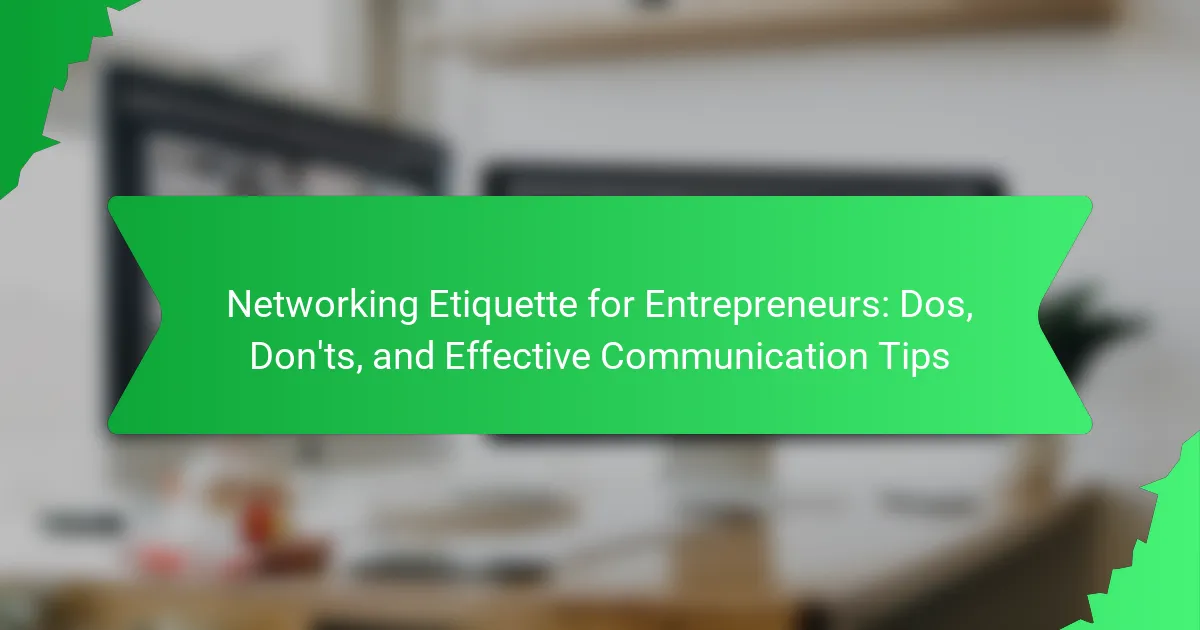Networking etiquette for entrepreneurs encompasses specific behaviors and practices essential for effective professional relationship building. Key elements include respectful communication, active listening, and timely follow-ups after meetings. Entrepreneurs are encouraged to introduce themselves clearly, maintain eye contact, and show genuine interest in others’ work while avoiding interruptions. Dressing appropriately and arriving on time at networking events are also critical. Strategies such as setting clear networking goals, leveraging social media, and joining professional organizations further enhance outreach and engagement, ultimately leading to increased business opportunities and growth. Research indicates that effective networking can significantly impact career advancement, with a majority of job placements occurring through networking connections.

What is Networking Etiquette for Entrepreneurs?
Networking etiquette for entrepreneurs involves specific behaviors and practices to build professional relationships effectively. It includes being respectful, listening actively, and following up after meetings. Entrepreneurs should introduce themselves clearly and provide relevant information about their business. Maintaining eye contact and a positive demeanor is essential during conversations. Additionally, it is important to avoid interrupting others and to show genuine interest in their work. Networking events require entrepreneurs to dress appropriately and to arrive on time. According to a study by the Harvard Business Review, effective networking can lead to increased opportunities and business growth.
Why is Networking Etiquette Important for Entrepreneurs?
Networking etiquette is important for entrepreneurs because it fosters professional relationships. Good etiquette creates a positive first impression. It shows respect and appreciation for others’ time and efforts. Proper networking can lead to valuable connections and opportunities. According to a survey by LinkedIn, 85% of jobs are filled through networking. Entrepreneurs who practice etiquette are more likely to gain referrals and collaborations. Additionally, effective networking can enhance an entrepreneur’s reputation in their industry. Ultimately, strong networking etiquette can contribute to long-term business success.
What are the potential consequences of poor networking etiquette?
Poor networking etiquette can lead to missed opportunities and damaged relationships. It may result in a negative reputation within professional circles. Professionals often remember encounters, and poor etiquette can overshadow positive interactions. This can limit future collaborations and referrals. Additionally, individuals may feel disrespected and less likely to engage again. In a survey by LinkedIn, 85% of professionals believe that networking is essential for career success. Poor etiquette can hinder access to valuable connections and resources. Ultimately, it can stall career growth and professional development.
How can good networking etiquette enhance business relationships?
Good networking etiquette enhances business relationships by fostering trust and respect. When individuals communicate effectively, they create a positive impression. This leads to stronger connections and potential collaborations. Respectful interactions encourage open dialogue and idea sharing. According to a study by the Harvard Business Review, strong networking can lead to increased opportunities and career advancement. Additionally, following etiquette guidelines can prevent misunderstandings and conflicts. This ultimately strengthens professional ties and promotes a collaborative environment.
What are the Key Dos of Networking Etiquette?
Key dos of networking etiquette include being polite and respectful. Always introduce yourself clearly and confidently. Maintain eye contact to show engagement. Listen actively to others during conversations. Follow up with new contacts after meetings. Use professional language in all communications. Be mindful of personal space and body language. Dress appropriately for the occasion to make a good impression. These practices help build strong professional relationships.
How should entrepreneurs introduce themselves in networking situations?
Entrepreneurs should introduce themselves clearly and confidently in networking situations. Start with your name and your business name. Follow up with a brief description of what your business does. Keep this introduction concise, ideally under 30 seconds. Make eye contact and offer a firm handshake. This establishes a personal connection and shows confidence. Tailor your introduction to the audience when possible. Highlight specific benefits or unique aspects of your business. This approach helps to engage listeners and makes your introduction memorable.
What are effective ways to follow up after networking events?
Effective ways to follow up after networking events include sending personalized emails. This email should reference specific conversations you had. It helps to remind the recipient of your interaction. Additionally, you can connect on professional networking platforms like LinkedIn. This action strengthens your professional relationship. Another effective method is to share relevant articles or resources. Doing so demonstrates your interest in their work. Following up within 24 to 48 hours is ideal. Timely communication keeps you fresh in their memory.
What are the Common Don’ts of Networking Etiquette?
Common don’ts of networking etiquette include being overly aggressive in promoting oneself. This behavior can alienate potential connections. Another don’t is interrupting others during conversations. Interruptions can signal a lack of respect. Additionally, avoid discussing controversial topics. Such discussions can create discomfort and conflict. Do not neglect to follow up after meeting someone. Failing to follow up can lead to missed opportunities. Also, refrain from using your phone during conversations. This can be perceived as disrespectful. Lastly, do not monopolize conversations. Engaging others is key to effective networking.
What behaviors should entrepreneurs avoid in networking scenarios?
Entrepreneurs should avoid being overly self-promotional in networking scenarios. Excessive bragging can alienate potential connections. Listening is crucial; interrupting others shows a lack of respect. Failing to follow up after initial meetings can lead to missed opportunities. Ignoring social cues can create uncomfortable interactions. Being unprepared with business cards or an elevator pitch reflects poorly on professionalism. Engaging in negative talk about competitors can damage credibility. Lastly, neglecting to show genuine interest in others can hinder relationship building.
How can entrepreneurs recognize and prevent networking faux pas?
Entrepreneurs can recognize and prevent networking faux pas by being aware of common social mistakes. They should actively listen during conversations to avoid dominating discussions. Maintaining eye contact shows engagement and respect. Entrepreneurs must also remember names to personalize interactions, which fosters connection. Avoiding controversial topics can prevent discomfort in networking settings. They should follow up after meetings to reinforce relationships and demonstrate professionalism. Observing body language helps entrepreneurs gauge reactions and adjust their approach. Lastly, being mindful of cultural differences enhances communication and respect in diverse networks.

How Can Entrepreneurs Communicate Effectively While Networking?
Entrepreneurs can communicate effectively while networking by being clear and concise. They should articulate their value proposition in simple terms. Active listening is crucial; it shows engagement and respect for others’ perspectives. Entrepreneurs must also ask open-ended questions to foster dialogue. Non-verbal cues, such as eye contact and body language, enhance communication. Tailoring their message to the audience increases relevance and connection. Following up after networking events solidifies relationships and keeps the conversation alive. These strategies are supported by research indicating that effective communication leads to stronger professional networks.
What are the best practices for effective communication in networking?
Effective communication in networking involves clarity, active listening, and building rapport. Clarity ensures that your message is easily understood. Use concise language and avoid jargon when possible. Active listening demonstrates respect and engagement. It helps you respond appropriately to the speaker’s points. Building rapport fosters trust, which is essential in networking. Initiate conversations with open-ended questions to encourage dialogue. Follow up after meetings to reinforce connections. According to a study by the Harvard Business Review, effective communicators are often perceived as more competent and trustworthy. This highlights the importance of communication in professional networking.
How can active listening improve networking outcomes?
Active listening enhances networking outcomes by fostering deeper connections and trust. It allows individuals to fully understand others’ perspectives. This understanding leads to more meaningful conversations. When people feel heard, they are more likely to engage positively. Active listening also helps in identifying shared interests and opportunities. According to a study by the Journal of Applied Psychology, effective listening improves relationship quality. This improvement can result in increased collaboration and referrals. Ultimately, active listening transforms networking from superficial interactions to valuable relationships.
What role does body language play in networking communication?
Body language plays a crucial role in networking communication. It conveys non-verbal cues that can enhance or detract from verbal messages. Effective body language includes eye contact, posture, and gestures. For instance, maintaining eye contact shows confidence and engagement. Open posture, such as uncrossed arms, signals approachability. Gestures can emphasize points and convey enthusiasm. According to a study by Mehrabian (1971), 55% of communication is non-verbal, highlighting the significance of body language. Additionally, positive body language can foster trust and rapport. In contrast, negative body language can create misunderstandings or discomfort. Therefore, mastering body language is essential for successful networking.
How can entrepreneurs tailor their communication style to different audiences?
Entrepreneurs can tailor their communication style by assessing their audience’s preferences and needs. Understanding the demographics of the audience is essential. For instance, younger audiences may prefer informal language and digital communication. In contrast, older audiences might appreciate a more formal approach and face-to-face interactions.
Adapting vocabulary and tone is crucial. Entrepreneurs should use industry-specific jargon when speaking to professionals but simplify language for general audiences. Active listening also plays a significant role. By paying attention to audience feedback, entrepreneurs can adjust their message in real-time.
Utilizing storytelling can engage audiences effectively. Tailoring stories to align with audience values enhances relatability. Additionally, visual aids can support communication for diverse groups. Research indicates that visuals can improve information retention by up to 65%.
Lastly, practicing empathy allows entrepreneurs to connect on a personal level. Recognizing emotional cues helps in adjusting the communication style appropriately.
What are some tips for networking with individuals from diverse backgrounds?
To network effectively with individuals from diverse backgrounds, prioritize active listening. Engaging with others by showing genuine interest fosters connection. Be open-minded and respectful towards different perspectives. This approach encourages meaningful conversations. Additionally, educate yourself about various cultures. Understanding cultural nuances can enhance communication. Attend events that celebrate diversity to expand your network. Research shows that diverse teams drive innovation and creativity. Building relationships across backgrounds can lead to new opportunities and insights.
How can entrepreneurs adjust their approach based on the context of the networking event?
Entrepreneurs can adjust their approach based on the context of the networking event by assessing the event’s purpose. For instance, a formal business conference requires a professional demeanor. In contrast, a casual meetup allows for a more relaxed interaction style. Entrepreneurs should tailor their conversation topics to align with the interests of the attendees. Understanding the audience helps in making relevant connections. Additionally, adjusting body language to fit the environment can enhance engagement. Active listening and asking open-ended questions are effective in both formal and informal settings. Adapting to the event’s tone fosters better relationships and networking success.

What Strategies Can Enhance Networking Success for Entrepreneurs?
Building strong relationships through networking is essential for entrepreneurs. Effective strategies include setting clear networking goals. This helps in identifying relevant contacts and opportunities. Attending industry events increases visibility and fosters connections. Utilizing social media platforms enhances outreach and engagement. Following up with new contacts solidifies relationships and opens further dialogue. Offering value to others creates goodwill and encourages reciprocity. Joining professional organizations provides access to resources and networking opportunities. Research shows that 85% of jobs are filled through networking, highlighting its importance for entrepreneurs.
How can entrepreneurs leverage social media for networking?
Entrepreneurs can leverage social media for networking by actively engaging with industry peers and potential clients. They should create professional profiles on platforms like LinkedIn, Twitter, and Facebook. Regularly sharing valuable content can enhance their visibility. Joining relevant groups and participating in discussions fosters connections. Commenting on posts from influencers can lead to meaningful interactions. Utilizing hashtags can broaden their reach and attract like-minded individuals. According to a 2021 report by LinkedIn, 70% of professionals were hired at companies where they had a connection. This statistic underscores the importance of networking through social media.
What platforms are most effective for entrepreneurial networking?
LinkedIn and Meetup are the most effective platforms for entrepreneurial networking. LinkedIn offers a professional space to connect with industry peers. It allows users to share insights and showcase expertise. Meetup facilitates in-person networking through organized events. Entrepreneurs can find local gatherings tailored to their interests. Facebook Groups also serve as a community for entrepreneurs to share resources and advice. These platforms enhance visibility and foster meaningful connections.
How can entrepreneurs create engaging content to attract networking opportunities?
Entrepreneurs can create engaging content by focusing on authenticity and value. Authentic content resonates with audiences and fosters trust. Value-driven content addresses the needs and interests of the target audience. Entrepreneurs should share personal stories that highlight their journey and lessons learned. This approach makes them relatable and encourages connection. Additionally, using visuals such as infographics and videos can enhance engagement. Research shows that visual content can increase engagement rates by up to 94%. Finally, entrepreneurs should encourage interaction by asking questions and inviting feedback. This two-way communication fosters relationships and networking opportunities.
What are some practical tips for successful networking?
Successful networking involves building genuine relationships and providing value. Start by researching attendees before events. This helps identify potential connections. Prepare a concise introduction that highlights your skills. Use active listening to engage others in conversation. Follow up with new contacts promptly after meeting. Utilize social media to maintain connections. Attend industry events regularly to expand your network. Lastly, offer assistance to others; this fosters goodwill and reciprocity.
How can entrepreneurs prepare for a networking event effectively?
Entrepreneurs can prepare for a networking event effectively by researching attendees and setting clear goals. Understanding the backgrounds of other participants helps in making meaningful connections. Setting specific objectives, like the number of contacts to make, provides direction. Practicing an elevator pitch ensures clear communication of their business ideas. Preparing business cards facilitates the exchange of contact information. Dressing appropriately creates a positive first impression. Finally, following up with new contacts solidifies relationships formed during the event. These strategies enhance networking effectiveness and increase potential business opportunities.
What should entrepreneurs keep in mind during follow-up communications?
Entrepreneurs should maintain clarity and conciseness during follow-up communications. Clear messages facilitate understanding and ensure the recipient grasps the intent. Conciseness respects the recipient’s time and increases the likelihood of a response. Additionally, entrepreneurs should personalize their messages. Personalization shows genuine interest and strengthens connections. Timeliness is also crucial; following up within a reasonable timeframe keeps the conversation relevant. Entrepreneurs should also express gratitude. Acknowledging the recipient’s time and effort fosters goodwill. Lastly, including a call to action encourages further engagement. This approach leads to more productive and meaningful interactions.
Networking etiquette for entrepreneurs is essential for building professional relationships and fostering business growth. This article covers key practices, including respectful communication, active listening, and appropriate follow-up strategies, while highlighting the importance of making a positive first impression. It outlines the dos and don’ts of networking, effective communication techniques, and strategies for leveraging social media to enhance networking success. Additionally, the article emphasizes the significance of tailoring communication to diverse audiences and the potential consequences of poor networking etiquette.
